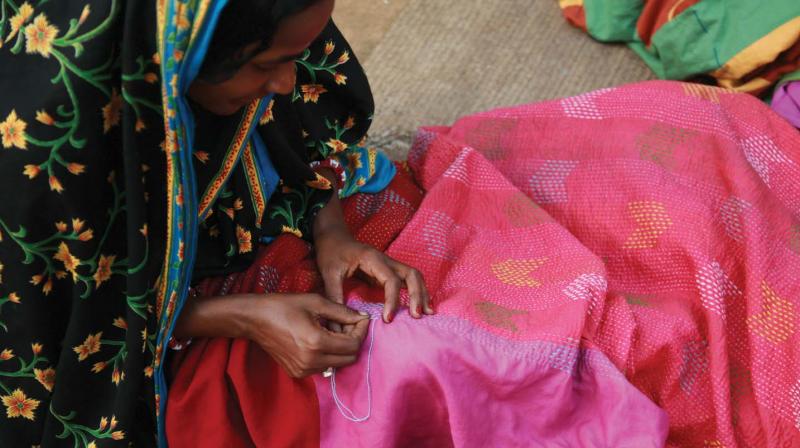A stitch in time: The artisans of Katna
Shabnam has been showcasing the products across India and it was in Alibaug that Jaya Mani (of Ambara) happened to meet her.

At the time of the telephonic interview, Shabnam Ramaswamy had just come out of circle time at school. “That is the time when children talk of their issues,” she said, of the students who come from poor families. “What is education for a child whose mother works in the fields the whole day?” Jagriti, in Katna, Murshidabad (West Bengal) is the school that Shabnam had started along with her husband Jugnu Ramaswamy in 2005. Just thirteen days before the school was to open, her husband died and Shabnam took on the task of running it. At the same time, she started Katna’s Kantha, a Street Survivors India project, which generates livelihood for about 1500 village women from 50 villages, by tapping into their expertise in kantha embroidery. “It is through the sale of these works, that we make money for the school as well as income for the women.”
Shabnam has been showcasing the products across India and it was in Alibaug that Jaya Mani (of Ambara) happened to meet her. Impressed by her work and her personality, Mani invited her for a show in the city. “These women are artists and must be treated like that,” Shabnam said. Elaborating on kantha work, she noted that unlike the traditional Hindu kantha embroidery, the Muslim tradition involves counting the stitches in order to create a grid-like geometrical design.
“Traditionally the Lep Kantha of old, involved village women sewing together layers of old cloth, mostly saris, with intricate stitches. The thread used for the purpose was pulled out of the sari itself. Their meticulous artistry transformed worn out rags into extraordinarily beautiful creations that could withstand further usage.” There are over 150 traditional designs as well new evolving ones, the expertise handed over from one generation to the other. “Since these women sit together to embroider, whenever a new member, someone’s daughter-in-law, joins, she teaches them the designs she learned from her family.”
At Katna, making kanthas (covers) is a ritual activity, from baby kanthas for new born, bridal kantha made by the mother of the bride to kantha made for covering the dead body. With Katna’s Kantha, women are asked to embroider at home so that they can do it at their leisure. “When designers give us work to do, the designs, colours and time period are all pre-assigned,” Shabnam said. But for shows like these, the women are given a free rein over the colour and designs. What she does is to assign women into groups of ten members with a team leader taking decisions on the patterns. “What I did was to take the women to cities and expose them to the colour palettes there as the traditional village colours can be ‘loud’ for urbanites,” she said.
Through the collective, women make about Rs 2,500 – 3000 a month. “This empowers them to have a say on family matters,” Shabnam said, “be it a daughter’s education to looking after her parents. This is possible only when the woman earns her own money.” Such support systems were something that Shabnam didn’t have when she left her marital home at the age of 24, taking her son with her. “I was born in a village in the interiors of Murshidabad,” she said. “Thanks to my father’s army job, I was able to study in Kolkata’s elite La Martinere School.” At 16, she was married to a wealthy 32-year-old. After years of domestic violence, she left the house and went to Kolkata. She stayed in a shanty at Sealdah station, worked her way through, got a diploma in Interior designing. “After 8 years, I got my chiffons and diamonds,” she laughed. But her calling to be a better human being led her to be a social worker in New Delhi where she met her second husband, Jugnu Ramaswamy.
“No matter what happened to me, I do everything I can to put my best foot forward,” she said. “There are many women who work harder than me and are not able to make it. But I am lucky enough to have survived. To be needed by the children here, the joy I get at the end of the day is unimaginable.” In order to spread this joy and empower the rural women with self esteem and independence, Katna’s Kantha is doing its bit, a stitch at a time.
